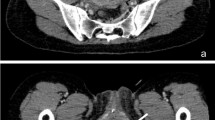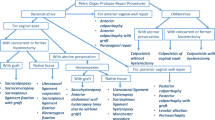Abstract
Background
Different surgical procedures are available for rectovaginal fistula repair. Most of these procedures fail in a substantial number of women, especially in those with a persistent fistula after prior attempts at repair. In addition, these procedures have a potential risk of dyspareunia and impairment of continence. The question is whether rectal sleeve advancement could be a valuable option for women with such a persistent rectovaginal fistula. The present study was aimed to examine the feasibility of this new procedure.
Patients and methods
Eight consecutive women (median age 41 years; range 28–53) with a persistent, low rectovaginal fistula underwent rectal sleeve advancement, six patients by a posterior “Kraske” approach and two patients by an abdominal approach. The aetiologies were obstetric trauma (n = 4), prior anal surgery (n = 2) and cryptoglandular fistulous disease (n = 2).
Results
Five patients had an uneventful postoperative course. Three patients encountered recurrent symptoms shortly after the procedure. In these three patients an additional transanal approach was performed to close the anal opening of the fistulous tract. This additional approach was successful in one patient. The median duration of follow-up was 12 months (range 3–17). The overall healing rate was 75%. None of the patients encountered de novo dyspareunia. One patient encountered involuntary loss of stool during the night postoperatively.
Conclusion
Based on these early results, rectal sleeve advancement, either by a posterior “Kraske” approach, or by an abdominal approach, seems to be a valuable alternative for the treatment of persistent rectovaginal fistulas.






Similar content being viewed by others
References
Daniels BT (1949) Rectovaginal fistula: a clinical and pathological study. University of Minnesota Graduate School, Minneapolis, p 84
Belt RL Jr (1969) Repair of anorectal vaginal fistula utilizing segmental advancement of the internal sphincter muscle. Dis Colon Rectum 12:99–104
Hibbard LT (1978) Surgical management of rectovaginal fistulas and complete perineal tears. Am J Obstet Gynecol 130:139–141
de Leeuw JW, Struijk PC, Vierhout ME, Wallenburg HC (2001) Risk factors for third degree perineal ruptures during delivery. BJOG 108:383–387
Venkatesh KS, Ramanujam PS, Larson DM, Haywood MA (1989) Anorectal complications of vaginal delivery. Dis Colon Rectum 32:1039–1041
Lowry AC, Thorson AG, Rothenberger DA, Goldberg SM (1982) Repair of simple rectovaginal fistulas. Influence of previous repairs. Dis Colon Rectum 31:676–678
Rothenberger DA, Christenson CE, Balcos EG et al (1982) Endorectal advancement flap for treatment of simple rectovaginal fistula. Dis Colon Rectum 25:297–300
Wise WE Jr, Aguilar PS, Padmanabhan A, Meesig DM, Arnold MW, Stewart WR (1991) Surgical treatment of low rectovaginal fistulas. Dis Colon Rectum 34:271–274
Jones IT, Fazio VW, Jagelman D (1987) The use of transanal rectal advancement flaps in the management of fistulas involving the anorectum. Dis Colon Rectum 30:919–923
MacRae HM, McLeod RS, Cohen Z, Stern H, Reznick R (1995) Treatment of rectovaginal fistulas that has failed previous repair attempts. Dis Colon Rectum 38:921–925
Watson SJ, Phillips RK (1995) Non-inflammatory rectovaginal fistula. Br J Surg 82:1641–1643
Tsang CB, Madoff RD, Wong WD et al (1998) Anal sphincter integrity and function influences outcome in rectovaginal fistula repair. Dis Colon Rectum 41:1141–1146
Zimmerman DD, Gosselink MP, Briel JW, Schouten WR (2002) The outcome of transanal advancement flap repair of rectovaginal fistulas is not improved by an additional labial fat flap transposition. Tech Coloproctol 6:37–42
Oom DM, Gosselink MP, Van Dijl VR, Zimmerman DD, Schouten WR (2006) Puborectal sling interposition for the treatment of rectovaginal fistulas. Tech Coloproctol 10:125–130
Berman IR (1991) Sleeve advancement anorectoplasty for complicated anorectal/vaginal fistula. Dis Colon Rectum 34:1032–1037
Hull TL, Fazio VW (1997) Surgical approaches to low anovaginal fistula in Crohn’s disease. Am J Surg 173:95–98
Marchesa P, Hull TL, Fazio VW (1998) Advancement sleeve flaps for treatment of severe perianal Crohn’s disease. Br J Surg 85:1695–1698
Halverson AL, Hull TL, Fazio VW, Church J, Hammel J, Floruta C (2001) Repair of recurrent rectovaginal fistulas. Surgery 130:753–758
Simmang CL, Lacey SW, Huber PJ Jr (1998) Rectal sleeve advancement: repair of rectovaginal fistula associated with anorectal stricture in Crohn’s disease. Dis Colon Rectum 41:787–789
Alexander SM, Mitalas LE, Gosselink MP, Oom DM, Zimmerman DD, Schouten WR (2008) Obliteration of the fistulous tract with Bioglue® adversely affects the outcome of transanal advancement flap repair. Tech Coloproctol 12:225–228
Schwandner O, Fuerst A, Kunstreich K, Scherer R (2009) Innovative technique for the closure of rectovaginal fistula using Surgisis™ mesh. Tech Coloproctol 13:135–140
Author information
Authors and Affiliations
Corresponding author
Rights and permissions
About this article
Cite this article
Schouten, W.R., Oom, D.M.J. Rectal sleeve advancement for the treatment of persistent rectovaginal fistulas. Tech Coloproctol 13, 289–294 (2009). https://doi.org/10.1007/s10151-009-0535-x
Received:
Accepted:
Published:
Issue Date:
DOI: https://doi.org/10.1007/s10151-009-0535-x




